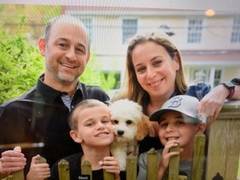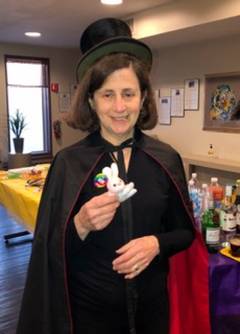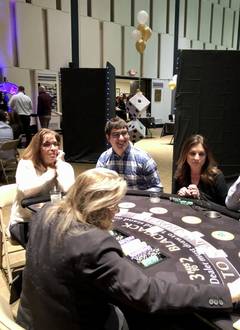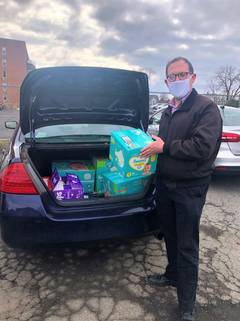The Power of We (Kol Nidre 5786 2025)
10/03/2025 07:39:37 AM
| Author | |
| Date Added | |
| Automatically create summary | |
| Summary |
One of the most moving, honest, and loving portrayals of Judaism I have ever encountered in popular culture emerged this year: the Netflix adult animated series Long Story Short. Created by Rapahel Bob-Waksberg, best known as creator of the hit show Bojack Horseman, the show tells the story of three generations of a Jewish family in a thematic, non-chronological way. Bob-Waksberg wanted to portray a Jewish family like the one where he grew up, where Judaism was an highly important, but not overwhelming, aspect of his family’s life. Bob-Waksberg offered this show as a corrective to other depictions of Jews where Judaism is either minimal and played for laughs and satire, or oppressive and played for drama (or both, as in the case of another recent Netflix show, Nobody Wants This).
The family depicted felt very familiar to me and probably would to you. The show drops many references to a certain kind of American liberal Judaism without explanation, which was especially fun for me to watch. For instance, in response to the claim that there is no one right way to be Jewish, the mother of the family responds: “But there is — a progressive egalitarian Conservative Judaism with an emphasis on ritual and community over faith and blind practice. That’s literally the only way it makes sense. I figured it out. And I gave it to my children because I love them. But they reject it because they want to reject me.” Anyway, I cannot recommend this show highly enough.
One of the show’s most moving scenes concludes an episode that provides the backstory on how one of the family’s daughters-in-law, Kendra, came to choose Judaism long before she married in to the family. In a desperate attempt to advance professionally, Kendra neglects her family, lies about being Jewish and missing work for Rosh Hashannah, and fires a long-time coworker in an especially cruel and undeserved manner in order to save the company money.
Keeping up the ruse of being Jewish, she finds herself attending synagogue for the first time on Yom Kippur. Kendra tentatively enters the synagogue while the congregation is chanting Ashamnu, the short confessional. A kind older woman sitting next to her explains: “These are the prayers of confession. We’re saying how we’ve sinned. We have trespassed. We have betrayed.”
“I have trespassed. I have betrayed,” Kendra recites, striking her chest. “We have deceived. We have mocked,” the older woman prompts her. “I have deceived. I have mocked,” Kendra repeats. Suddenly the older woman grabs Kendra’s clenched hand. “No, sweetie. We. We have.” “We,” Kendra repeats, and begins to cry. Ay yay yay yay yay…
We. “We” perhaps is the most essential word of Yom Kippur. This is what Kendra learned from her anonymous teacher in that scene. While we may sin individually, we confess collectively. It is not obvious that this should be the case. In fact, originally, confession in Judaism was written in the individual: “Please, God, I have sinned, I have done wrong, I have rebelled before You”
Over time, though, the confession became phrased in the plural. While this change softened the humiliation of confession, the plural language also reminds us that we are far from alone in our sin. Everyone here has something to atone for. There’s no hiding it, and no need to. Indeed, as the Talmud says: “Any fast that does not include the sinners of the Jewish people is not a fast.”
Yes, being part of these larger wholes can infringe on our individual freedom and impose obligations on us. Yet our liturgy reminds us of the positives of these entanglements. We can look around at the room full of people and take some comfort in knowing that we are not alone in our failures and shortcomings. We can know that others probably made the same mistakes we made, and are also committed to trying to make it right. And if we feel victimized by other people’s sins, we can also know that there is probably someone else out there who feels victimized by our own sins.
This shared experience of sin connects us one to another, across time and space. The power of this “we” is what caused Kendra to sob in that Yom Kippur service and sent her on the path toward Judaism.
As we, all of us, stand before God today, what is the content of our confession? This year, I’d like to focus our attention on one of the sins mentioned in Al Khet: al khet shekhatanu lifanecha b’zilzul horim umorim. For the sin we have committed before you by disrespecting parents and teachers.
The words used here for parents and teachers come from the same Hebrew root as the word Torah itself. Parents and teachers are those responsible for the transmission of tradition from one generation to the next. Their role is essential in any community and certainly in a Jewish community.
Respecting parents is familiar, of course, as a core Jewish value and mitzvah. It is one of the ten big ones. We show this respect in gestures, such as not addressing our parents by their first names, and also in material support, particularly as they age.
Less familiar is the Jewish obligation to honor teachers as bearers of Torah, as much as, if not more, than our own parents. Judaism has an expansive view of who counts as our teacher. Pirke Avot teaches: “One who learns from another one chapter, or one law, or one verse, or one word, or even one letter, is obligated to treat that person with honor.” We show respect for the Torah by respecting those who teach it, even in minimal ways.
Whoever inserted the sin of disrespecting parents and teachers into the mahzor likely meant to refer to the disrespect of our own parents and teachers. This is a sin we would do well to be on guard against. But the words do not actually say that. They refer to disrespecting parents and teachers–which perhaps means not only our own parents and teachers, but all parents and teachers. So this Yom Kippur, I’d like to reflect on how our society, our community, this “we” that is essential to Yom Kippur, treats the parents and teachers among us.
I want to first note that I approach this subject from the position of someone who is not a parent. I can not speak from personal experience about the difficulties of parenting. Nor am I using this sermon to simply vent my personal frustrations with parenting, for the simple reason that I do not have any. Instead, I speak about this from my perspective as someone who observes and interacts with our community and our society–from the very young to the very old.
What has become clear to me, and not only to me, is how difficult parenting has become. The difficulty is revealed in research that shows parents are about twice as likely to feel overwhelming stress compared to non-parent adults. While parenting was never easy or stress-free, a confluence of factors have made parenting young children in this particular generation more difficult than in the past, it’s fair to say.
Many of these changes are economic: the rise of the two-income household as a feminist accomplishment but also an economic necessity; the greater hours and stress required to establish and maintain one’s career; rising costs of child care and pretty much everything else; increasing economic inequality that drives parents to ensure that their children will be on the winning side of that widening divide.
Some of these changes are cultural: the expectation that children be supervised and engaged in adult-organized activities at all times, rather than left to roam the neighborhood or watch TV all afternoon, as perhaps they did in the past; the rise of an intensive parenting style that requires much more time and effort than in the past, cheered on by an endless supply of books, apps, and self-appointed social media influencers; the $40 billion youth sports industry, with increasing commitment and professionalization at younger and younger ages; and the rise of social media, with children being exposed to more and more mature content at earlier and earlier ages.
To the parents in the room struggling with all of this: I see you. I know that some days, just getting everybody out of the house is a major accomplishment. I know that this is hard and that in many ways our society leaves you to figure this out all on your own. You deserve better. I’m sorry.
I was speaking earlier this year to a parent in our community, who explained that her family had set out to not overschedule their children and leave plenty of unstructured time for the kids. She quickly discovered that any such time got sucked up by screens of various kinds. So now, with some reluctance, the parents spend their afternoons and weekends chauffeuring the children around to various activities. For all the stress and expense of this lifestyle, at least they know that the kids will be engaged in edifying activities like soccer and dance and Jewish education, too, rather than an endless stream of YouTube videos. It is how they are making it work.
And yet, for all of this difficulty, I hear way too much judgment of other people’s parenting. Like many things, there is no one right way to be a parent. Yet, perhaps as a way of reinforcing our own parenting choices and styles–past, present, or future–we rush to judge and shame parents based on a minimum of information. We hold parents to an impossible, idealized standard of what parenting could be. We give unsolicited opinions in word and in deed. We fail to consider just how hard this is. Al khet–I’ve been guilty of this too.
All of this can create and heighten anxiety and self-doubt among parents. Compounding the problem, fear of judgment causes parents to avoid the very people–other parents, relatives, and neighbors–who could help them navigate the ups and downs of parenting.”
Likewise, our society’s real superheroes: teachers. People like to reminisce about the days when a phone call home from a teacher was a moment of terror for the student, not the teacher. Nowadays, teachers are subjected to mistrust and disrespect all around: from students, administration, parents, politicians, and voters. Al khet: We forget the wisdom expressed by the Israeli educator Haim Ginott: “Teachers are expected to reach unattainable goals with inadequate tools. The miracle is that at times they accomplish this impossible task.”
But the ultimate disrespect to both parents and teachers is when those who are neither expect these two groups to bear alone the burden of raising the next generation. They say it takes a village to raise a child. Indeed, in most times and places in human history, and in our own society within living memory, it was common for children to grow up surrounded by a thick community. Children benefited from a shared understanding that raising children was a collective responsibility and not a private one of parents.
Those good old days are probably not coming back. But we’re seeing in real time what happens when families are left to bring up children in the absence of a thick, supportive community. And there, my friends, is where you all come in.
We at KTI cannot only be a community that comes together annually to confess our sins, wish each other a happy new year, and see one another next year. As powerful as that is, as much as I enjoy seeing you fill the synagogue on these days, it is just not enough of a “we.”
If we are going to confess our sins together and mean it, we have to do lots of other things together too. Indeed, synagogues are among the last multi-generational, cradle-to-grave institutions in our society. It’s what I love about being a rabbi.
All that means that the “we” which experiences Yom Kippur together is uniquely positioned to contribute to the sacred task of raising the next generation. Today’s parents and teachers do not need our judgment or disrespect. Instead, these heroes need our support.
We do this by offering our financial resources, our social capital, and most importantly, our time, in sustaining a Jewish community. The next generation of knowledgeable, confident, well-adjusted Jews is not going to raise itself. This task belongs to all of us. That “we” includes “you.”
No matter who we are, there are ways we can help. One important way we can help is by role modeling: being part of a community that embraces Judaism with love and commitment. This can look like showing up for a bar or bat mitzvah service just because it’s Shabbat, and showing the youth there that this is something that Jews do. Older Jews like to see younger Jews doing Jewish: it gives them lots of nachas. But younger Jews also need to see older Jews doing Jewish: it gives them something real to look forward to. This is what creates the “we” that is the superpower of a synagogue community.
We also need help with our revamped educational program, now known as the Community Learning Center or CLC. We have a new schedule, teaching staff, and curriculum that has already shown great promise. We also hope to provide our students with more opportunities to put their Jewish values into action through hands-on community service projects. A few have already been planned, like our current clothing drive in support of Sharing Shelf. But we need more. If you know of a mitzvah opportunity for our students–please be in touch.
Our Sages teach that honoring parents is the most difficult of the mitzvot. Yet it is also the mitzvah whose reward the Torah promises us: a long life. I don’t know if honoring parents literally increases the number of our years. But I do know that being a community that honors parents, that takes collective responsibility for the next generation, that withholds judgment and instead offers support, will lengthen the lives of our community, our people, and our society. Ken yehi ratzon, so may it be God’s will. Amen.
Tue, October 21 2025
29 Tishrei 5786
Photo Gallery
Photo Albums
Upcoming Events
-
Wednesday ,
OctOctober 22 , 2025Rabbi, May I? Modern Responsa
Wednesday, Oct 22nd 10:00a to 11:30a
Wednesdays, 10 - 11:30 AM, KTI Library Ever since Abraham’s famous argument with God, Judaism has been full of debate. Moses and Korah, David and Nathan, Hillel and Shammai, the Vilna Gaon and the Ba’al Shem Tov, Spinoza and the Amsterdam Rabbis . . . the list goes on. No wonder that Judaism cherishes the expression machloket l’shem shamayim, “an argument for the sake of heaven.” Beyond their historical importance, what makes these disputations so compelling is that nearly all of them, regardless of their epochs, are still being argued. The parade of characters spanning three millennia of biblical, rabbinic, and modern disputation reflects the panorama of Jewish history with its monumental political, ethical, and spiritual challenges. This series will examine Jewish responses to exile from the biblical period to our modern day. Considering texts from all genres of Jewish literary creativity, we will explore how the realities and iterpretaions Join as we re-open these timeless debates that lead us to the core of 3,000 years of Jewish conversation. • Justice: Abraham vs. God (October 19) • Holiness and Authority: Moses vs. Korah (November 9) • Inclusion: The Five Daughters vs. the Twelve Tribes (November 30) • Accountability and Morality: David vs. Nathan (December 21) • Resistance: Ben Zakkai vs. the Zealots (January 18) • Law: Hillel vs. Shammai (February 15) • Spirituality: The Vilna Gaon vs. the Baal Shem Tov (March 15) • Boundaries: Spinoza vs. the Amsterdam Rabbis (April 19) • Religious Evolution: Geiger vs. Hirsch vs. Frankel (May 10) • Zionism: Herzl vs. Wise (May 31) -
Wednesday ,
OctOctober 22 , 2025Wrestling with God
Wednesday, Oct 22nd 8:00p to 9:30p
Wrestling with God Wednesdays, 8-9:30 PM Congregants’ homes TBA We need to talk about God. And about how we talk, and don’t talk, about God. It’s a big topic, maybe the biggest. This offering invites adult learners into compassionate inquiry, deepening their relationship to Jewish text through collective exploration. Using the album s*ngs ab-ut g?d [https://open.spotify.com/album/6JEY2AN6awAxNfWwmXX460] by Jewish educator Eliana Light as a starting point, this series blends music, Hebrew text study, and open-ended questions to help participants examine their own connections to the divine. This is sacred work. It’s not about getting it right. It’s about showing up with curiosity, humility, and a willingness to join the long lineage of Jews who wrestle with God. Each session stands alone, but we’d love to have a consistent group as much as possible. Dates: September 10: skyman October 22: shadows November 19: in the silence December 10: if only January 21: lead me back February 11: three steps March 11: beyONEd April 29: the mountains May 20: the name June 17: I rise -
Thursday ,
OctOctober 30 , 2025Coffee with the Rabbi
Thursday, Oct 30th 8:00a to 9:00a
Start your morning with some caffeine and casual or meaningful conversation! Join Rabbi Goldberg for a Coffee Chat! Stop by Rye Ridge Starbucks any of the following Thursdays, between 8-9am: June 12 and 26 July 10 and 24 August 7 and 21 September 4 and 18 October 16 and 30 November 6 and 20 December 4 and 18 -
Saturday ,
NovNovember 1 , 2025Dror Israel Shabbat
Shabbat, Nov 1st 11:30a
Dror Israel Shabbat Dror Israel’s Mirit Sulema, along with two leaders of the Arab Youth Movement NOAL, Tal Tunik and Shadi Habiballa, will speak during a Kiddush lunch about their important work with Arab Israeli youth and bringing Jewish, Arab, and Druze youth together. Saturday, November 1st, approx. 11:30am KTI Social Hall "We eat together, laugh together. We talk about what we think of each other, and what will help bring peace.” RSVP Appreciated -
Saturday ,
NovNovember 1 , 2025KTI Gala - A November to Remember Digital Journal
Motzei Shabbat, Nov 1st 7:00p to 10:00p
Privacy Settings | Privacy Policy | Member Terms
©2025 All rights reserved. Find out more about ShulCloud






